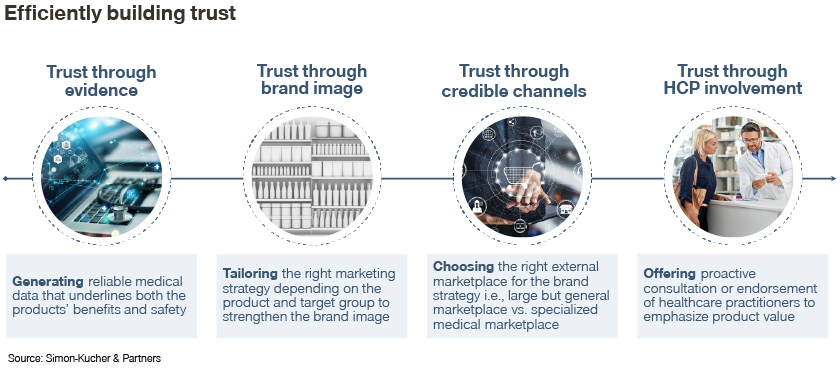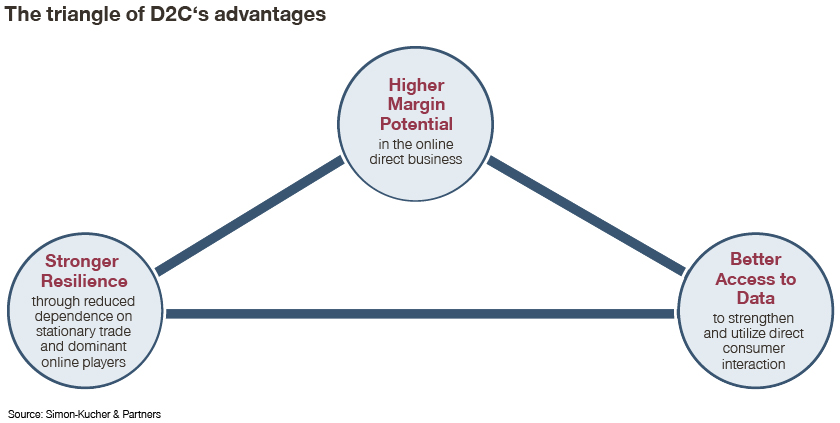The channel landscape in healthcare, particularly in consumer healthcare, is undergoing significant changes, as digital plays an increasingly important role. The D2C approach is a promising way for CHC manufacturers to engage with consumers directly. What do they need to consider when transitioning to a direct-to-consumer model?
Consumers are becoming increasingly open to paying out of pocket for health products and, at the same time, are expecting to have a smooth digital channel experience with all the relevant information they’re used to getting from healthcare professionals.
Consumer healthcare (CHC) manufacturers can harness this growth by stepping into a new arena: the direct-to-consumer (D2C) channel. However, as the D2C online approach is still new to the healthcare world, many CHC manufacturers aren’t ready for this change.
Is the D2C channel worth investing in? What do CHC companies need to consider? And most importantly, how can they truly benefit from the channel in the long run?
Back to basics: The evolution of D2C
In recent years, technological growth has been the main driver for the ever-expanding e-commerce and D2C landscape, which has unlocked a range of new opportunities for manufacturers. The ability to collect, connect, and process large amounts of data has paved the way for the success of the D2C channel.
The number of consumers moving away from traditional retailers to buy directly from brands has been growing quickly — and not only younger generations of digital native consumers. Worldwide, 40 percent of generation X ordered products directly from multi-brand or single-brand retailers in 2021.
In some industries, such as the consumer goods and retail sectors, the D2C channel is already well established, driven by startups launching new brands. At the same time, a wave of D2C brands has entered the healthcare market, particularly in nutrition, vitamins, and skincare. In France, for example, the current vitamins and nutrition landscape illustrate the significant growth of the D2C channel over the past few years. In 2021, the D2C market share made up 11 percent of the vitamins and nutrition market, and between 2019 and 2021, e-commerce and D2C revenue grew by 36.5 percent.
Low consumer acquisition costs, a controlled consumer experience, and a loyal consumer base – private equity and venture capital investors have also recognized D2C’s potential for the CHC industry. One successful example is the funding of Roman (Ro), which raised 500 million US dollars in 2021 after only three years of being founded. Today, it is valued at five billion dollars.
However, a growing number of established manufacturers has also started to embrace D2C and initiated direct relationships with their consumers.
D2C undoubtedly holds exciting potential for manufacturers, and project results in the Simon-Kucher Consumer Goods division reflect this. An analysis of recent projects shows that the expansion of a D2C online store paid for itself within twelve months with a factor of five to ten times on the initial investment.
D2C 2.0: More than just your own web store
Just as the overall channel landscape is evolving, the view on what D2C is, is changing as well. According to the traditional view, D2C refers to companies selling products directly to consumers via their own website, bypassing intermediaries like retailers or wholesalers. However, when looking how online marketplaces such as Amazon Marketplace, Zalando, eBay, or About You do business, there seems to be a need to expand on the traditional definition of this term.
Integrating D2C in an omnichannel strategy is more than simply setting up a new sales channel. D2C is about taking control of the consumer journey by directly communicating with and gaining insights from consumers. This outreach can be done in varying degrees, from a full control model, where companies sell their products via their own online store without intermediaries, to a hybrid version, where specific aspects are still outsourced to intermediaries (e.g., using pharmacies as distributors for products). What sets D2C companies apart is that they are also their consumers’ key point of contact and therefore in control of all relevant insights and the entire consumer journey. The insights generated can be used to personalize marketing activities based on an optimized data analysis and provide clarity about product preferences, allowing the product portfolio to be tailored to consumers’ needs. In the long run, D2C reinforces consumer loyalty based on better understanding and engaging of consumers. Therefore, we refer to direct-to-consumer, whenever a manufacturer is in control of the consumer journey and has direct access to consumer purchasing data regarding their own products.
D2C in consumer health: The trust factor
The consumer health sector is structurally different from other industries with D2C experience. The healthcare sector is one of the most densely regulated markets. Regulatory restrictions are mostly relevant when it comes to prescription and pharmacy-only products. As regulatory restrictions are less complex for non-pharmacy products, today, the D2C channel is mainly used to sell these products. Yet, another key factor makes a significant difference: trust.
When it comes to health, consumers are cautious and conduct more research before they try and trust a brand. Our consumer study results confirm that the fear of counterfeiting is the main reason consumers don’t buy CHC products online (37 percent). In addition, 64 percent of consumers under 65 think that healthcare providers with a well-established online image are more likely to have better offerings. Another aspect to consider is the healthcare consultation. 37 percent of consumers have never purchased a healthcare product online because they don’t receive a personal consultation.
“You will only gain consumers’ trust by providing lots of consumer reviews, quality PR coverage, and, of course, a clear explanation as to why you are better.”
– Anton Kononov, Founder FORMEL Skin
Based on our study insights, we identified the following ways D2C companies can gain consumers’ trust:

The triangle of D2C advantages: How CHC companies can benefit
For CHC manufacturers, it’s an exciting time to venture into the world of D2C, as this approach offers major benefits in comparison to traditional channels, especially if it’s part of an integrated omnichannel play. Unlike smaller startups, established CHC manufacturers can leverage these benefits, since their products are often well known, which contributes to the trust factor.
Three key advantages:
- Stronger resilience: Manufacturers with strong channel dependencies are less resilient in a volatile world. This was once more underlined by the COVID-19 pandemic. In April 2020, US retail sales fell by 16.4 percent, which was the highest recorded drop in US history. Even though this challenge only partially applies to the healthcare industry due to its fundamental role for society, CHC companies offering over-the-counter products can still be affected. Therefore, a strong D2C approach reduces dependency on the very dominant online retailers/pharmacies.
- Higher margin potential: Due to increased pricing control and more effective/efficient promotions, D2C offers higher margin potential. By bypassing intermediary entities, companies can invest directly into their consumer relationship, further invest into product development, and expand consumer segments by creating additional price positioning options.
- Better access to consumer data: The D2C model facilitates data collection and therefore provides a 360-degree view of the consumer shopping journey. Connecting and using this data is key to the entire D2C model, transforming the organization to integrate enhanced consumer data into regular business processes and strategic decision-making is what makes D2C a commercial success.

“Compared to other channels such as the traditional physician visit, D2C offers a clear advantage to patients by providing a frictionless access to healthcare products, as they are used to from other consumer segments.”
– Anton Kononov, Founder FORMEL Skin
Embracing D2C: Futureproof your healthcare business
As developments in other industries and growing private equity and venture capital funding in CHC show, D2C will take on a central role in the future channel landscape. Consumers are becoming more and more proactive about their own health, using the online channel to obtain healthcare products and information. In response to shifting buying patterns, CHC manufacturers should dip their toes into the world of direct-to-consumer and accelerate their digital transformation. The healthcare industry is entering a new phase, and the time to act is now.
More from this series:
Evolving Distribution Channels: Unlocking E-commerce Excellence for CHC
